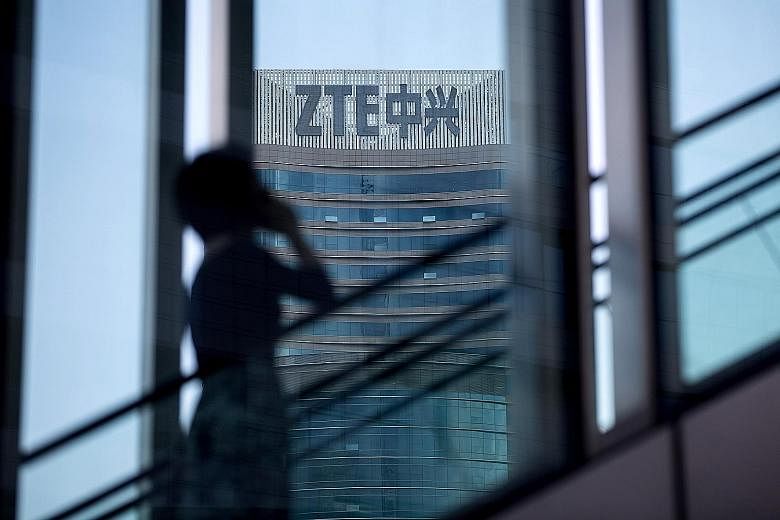United States President Donald Trump's top trade team was set to resume negotiations with China yesterday in Washington, amid signals that a bargain may be struck over Chinese tech company ZTE.
The US is looking for a way to lift a ban on the company in exchange for more imports of American agricultural products by China.
US Commerce Secretary Wilbur Ross said on Monday that he hoped the strong personal relationship between President Trump and China's President Xi Jinping will "facilitate an agreement (on trade) just as it seems possibly to be doomed".
In a U-turn on ZTE that raised eyebrows, Mr Trump tweeted on Sunday: "President Xi of China, and I, are working together to give massive Chinese phone company, ZTE, a way to get back into business, fast. Too many jobs in China lost. Commerce Department has been instructed to get it done!"
The Commerce Department last month banned American companies from selling products and services to ZTE for seven years, in effect crippling the company which employs about 75,000 in China.
The ban came after ZTE apparently violated the terms of a settlement, in which it was fined US$1.1 billion (S$1.4 billion) in March last year for violating US sanctions by shipping American technology to Iran and North Korea.
Mr Ross told journalists on Monday at the National Press Club in Washington: "Our position is (the ZTE case) is an enforcement action, separate from trade."
But he added: "ZTE did do some inappropriate things... the question is: Are there alternative remedies to the ones we had originally put forward? And that's the area we will be exploring very, very promptly."
Hours later, Mr Trump again tweeted: "ZTE, the large Chinese phone company, buys a big percentage of individual parts from US companies. This is also reflective of the larger trade deal we are negotiating with China and my personal relationship with President Xi."
Meanwhile, the Wall Street Journal reported that Beijing would back away from threats to apply tariffs on American farm products in exchange for easing the ban on American companies selling components to ZTE.
And Reuters cited two unnamed sources as saying China was willing to import more American agricultural products in return for Washington easing up on the penalty against ZTE.
A regulatory issue has, thus, become bound up with trade.
But the ZTE case has a security dimension to it as well: The Pentagon has banned ZTE smartphones from US bases over spying fears.
Republican Senator Marco Rubio tweeted on Monday: "Apparently, 'deal' is we lift sanctions imposed on ZTE for helping Iran and North Korea and they can resume spying and stealing our intellectual property. In return, China removes tariffs on US farmers who did no wrong.
"China intends to dominate the key industries of the 21st century not through out-innovating us, but by stealing our intellectual property and exploiting our open economy while keeping their own closed. Why are we helping them achieve this by making a terrible deal on ZTE?"
In another deal that may be related to decisions on ZTE and trade, China could green light San Diego-based Qualcomm's deal to buy Dutch-based NXP Semiconductors.
The US$44 billion deal announced in October 2016 has reportedly received approval from nine global regulators, but not yet from China's Ministry of Commerce - which, according to reports, has now been asked to hasten its review.
Chinese Deputy Prime Minister Liu He was due in Washington yesterday for talks with US officials.
The US is demanding a significant reduction in the US$375 billion goods trade deficit with China. It also wants China to end subsidies to key industries, forced joint ventures and technology transfer for US companies in China, and theft of intellectual property rights.
Mr Ross shrugged off fears of Chinese retaliation. "If China retaliated with a 25 per cent tariff on US$50 billion of our exports as threatened, we will lose a major fraction of that value but not all," he maintained.
Even a full US$50 billion hit to US exports to China would be "painful to the direct targets but would have less than three-tenths of 1 per cent impact on our US$18 trillion economy".
"China sells us far more than we sell them; given the lopsided balance, they will run out of targets for tariffs much sooner than we would."

